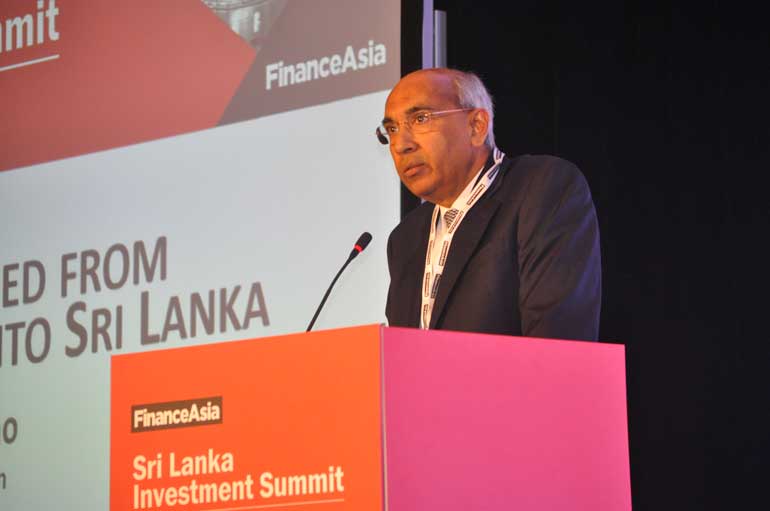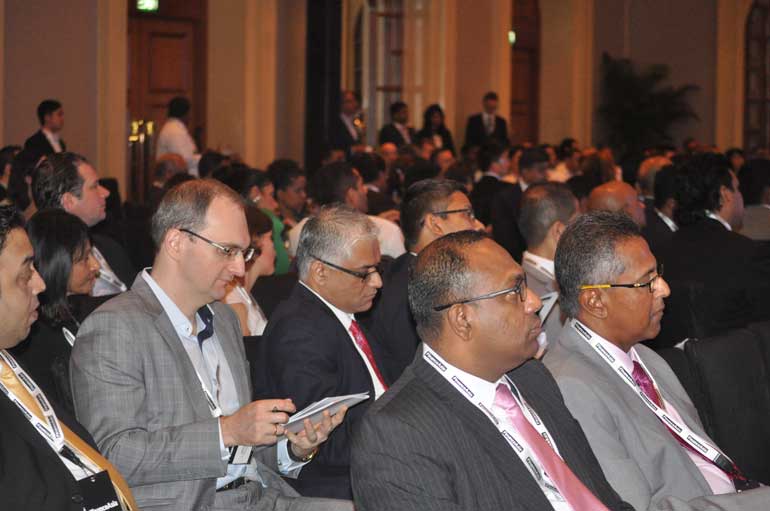Thursday Feb 26, 2026
Thursday Feb 26, 2026
Monday, 4 April 2016 00:00 - - {{hitsCtrl.values.hits}}

Shangri-La Vice President Madhu Rao
World famous hotel chain Shangri-La’s Vice Chairman Madhu Rao made a very lucid presentation at the Sri Lanka Summit in Singapore capturing some of the highlights of its entry in to Sri Lanka, challenges faced initially and the follow up early success as well as the various level of Government responses. Here are excerpts:
We were committed to invest $ 500 million in two major projects in Sri Lanka first of which will open in June as a golf resort in  Hambantota.
Hambantota.
In 2010, the Sri Lankan Government via a known intermediary invited us to look at prospects in Sri Lanka for Shangri La. At that time the country was coming out of conflict and we realised that tourism is going to be one of major pillars of the economy to propel future growth. This is because of tourism’s positive impact on employment and foreign exchange earnings as well tourism multiplier. As per UNWTO study tourism multiplier as 3.2 i.e. every dollar spent by a tourist has a ripple effect of 3.2 times income generation for the economy.
More importantly, we found that all three ingredients for success in tourism are very high in Sri Lanka. All we had to do was try and realise them. Most importantly Sri Lanka has very warm and friendly people. That is a very important ingredient for tourism for visitors to feel welcome and come back. Secondly Sri Lanka’s rich collection of natural attractions, flora and fauna, hill country, heritage, improved air connectivity and very strong ground support.
Shangri La as compared to global peers, we are not an asset-light organisation but a hybrid organisation. We have 97 hotels apart from associate real estate operations we own and operate. Out of that we have investments in 77 hotels and 20 hotels we operate for third party investors. We are in a position to make capital commitment where we find attractive opportunities. As compared to other peers, we are looking at development capital and somebody to take the development risks.
We have always been an Asia focused hotel chain with 50% of our portfolio in mainland China and baring three hotels in Europe and five in Middle East managed for third parties and a few in North America, the rest in Asia Pacific region.
As a consequence to our first visit, we realised Sri Lanka is a country we could do business with. It gave a sense of satisfaction that we were in a position to join hands with the Government in helping the rebuilding of post-war Sri Lanka. We were driving through Colombo in search of sites. We passed by Galle Face and the Army Headquarters and we felt this was the best site. However we wondered how to propose this. During a meeting with the Government when asked what sites we liked, we asked whether it is possible to take the Army Headquarters. To our surprise the then Defence Secretary shared that he doesn’t believe that Army has any business to be located in the city anymore and he was thinking of relocating the Army to another part of the city and if we are  convinced this site is best, then we will consider after proper evaluation of Government approved valuer.
convinced this site is best, then we will consider after proper evaluation of Government approved valuer.
Everything was very transparent and after a few weeks we came up with a valuation and considering the size of the investment of $ 500 million and being under Strategic Development Projects Act, we requested the Government to consider granting us freehold status. We managed to get freehold land, perhaps the only to get as the Government went back to 99-year lease rights only. The negotiations leading to grant of benefits under Strategic Development Projects Act was very businesslike.
The officials who were involved very engaging and on the day we concluded discussions we reached agreement by 10:30 p.m. enabling me to take the night flight to Hong Kong. The level of commitment was really amazing. Thereafter there was a change of Government. Originally there was some level of apprehension among the management whether or not it will be business as usual. But I can tell you with confidence that nothing has changed in terms of the level of engagement.
In fact the Government has been a little more proactive than before. We have had a few issues in terms of bureaucratic interpretation of the benefits made available for us bringing about doubts. We made representations and found the Government very understanding having heard our case, the Government went to the extent of rectifying the bureaucratic pronouncements. So the level of engagement is continuing at the same level.
One piece of advice I can give people gathered at this Singapore Summit is approach Sri Lanka with a reliable development partner who will facilitate the implementation. This is important in countries like Sri Lanka, India etc. They will be a useful guide to tell dos and don’ts in terms of day to day conduct.
We have had the benefit of a wonderful development partner and support from the Government. Another anecdote is in the early days of the engagement with Sri Lankan Government. We were appalled to see the type of room rates that were prevailing in Sri Lanka. The average four-star rate was $ 80. It was our fear that with so many projects coming up, this would be detrimental to the economy in the medium to long term. Given the financial commitment to the construction, low rates would not make project viable.
In that context we were encouraged by the Government introducing a floor rate for the city hotels to prevent hotels under cutting each other. We strongly feel Sri Lanka as a destination should be a value for money destination, that is affordable but not a cheap destination.
Overall there has been positive and pragmatic Government policy which is still in place in Sri Lanka. We are very happy that we have taken the right decision in investing in Sri Lanka. We went in with a half a billion dollar commitment and given the future demand, we have up scaled and the investment has risen to $ 850 million
